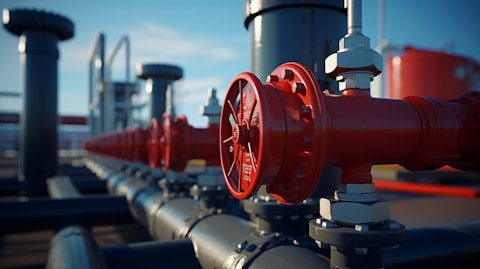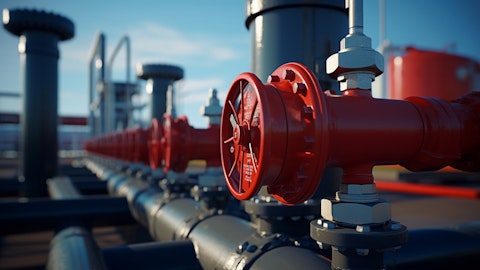Atmos Energy Corporation (NYSE:ATO) Q2 2024 Earnings Call Transcript May 9, 2024
Atmos Energy Corporation isn’t one of the 30 most popular stocks among hedge funds at the end of the third quarter (see the details here).
Operator: Thank you for standing by. At this time, I would like to welcome everyone to the Atmos Energy Corporation Fiscal 2024 Second Quarter Earnings Conference Call. [Operator Instructions] Thank you. I would now like to turn the call over to Dan Meziere, Vice President of Investor Relations and Treasurer. Dan, please go ahead.
Dan Meziere: Thank you, Greg. Good morning, everyone, and thank you for joining our fiscal 2024 second quarter earnings call. With me today are Kevin Akers, President and Chief Executive Officer; and Chris Forsythe, Senior Vice President and Chief Financial Officer. Our earnings release and conference call slide presentation, which we will reference in our prepared remarks, are available at atmosenergy.com under the Investor Relations tab. As we review these financial results and discuss future expectations, please keep in mind that some of our discussion might contain forward-looking statements within the meaning of the Securities Act and the Securities Exchange Act. Our forward-looking statements and projections could differ materially from actual results. The factors that could cause such material differences are outlined on slide 30 and more fully described in our SEC filings. With that, I will turn the call over to Kevin Akers, our President and CEO. Kevin?
Kevin Akers: Thank you, Dan, and good morning, everyone. We appreciate your interest in Atmos Energy. Yesterday, we reported year-to-date fiscal ’24 net income of $743 million or $4.93 per diluted share. And we updated our fiscal ’24 earnings per share guidance to a range of $6.70 to $6.80. This performance continues to reflect the commitment, dedication, focus, and effort of all 5,000 Atmos Energy employees to successfully modernize our natural gas, distribution, transmission, and storage systems, while safely providing reliable natural gas service to 3.4 million customers in 1,400 communities across our eight states. For the quarter, we continue to experience robust customer growth, driven by continuing favorable employment trends in Texas, along with a strong new housing market in the North Texas area.
For the 12 months ended March 31, 2024, we added over 56,000 new customers with more than 43,000 of those new customers located in Texas. New-home starts in North Texas were up 44.7% during the first calendar quarter of ’24 compared to the first quarter of 2023. As a result, the annual new-home start rate is now at the highest pace since mid-2022. The Texas Workforce Commission reported in April that the seasonally-adjusted number of employees reached a new record-high at over $14.1 million. Texas again added jobs at a faster rate than the nation over the last 12 months ending March, adding nearly 271,000 jobs, representing a 2% annual growth rate. Industrial demand for natural gas in our service territories also remained strong. During the second quarter, we added 11 new industrial customers with an anticipated annual load of approximately 1 Bcf once they are fully operational.
Fiscal year-to-date, we’ve added 22 new industrial customers with an anticipated annual load of approximately 4 Bcf, once they are fully operational. On a volumetric basis, this is equal to adding approximately 68,000 residential customers to our system. Commercial customer growth remained solid as well with over 900 customers connecting to the system during the second quarter and over 2,000 customers connecting to the system fiscal year-to-date. This growth continues to highlight the value and vital role natural gas plays in economic development across our service territories. In APT, we continue our work on several projects that will enhance the safety, reliability, versatility and supply diversification of our system as well as support the continued growth we are seeing in the local distribution companies behind APT system.
Work continues on the fourth and final phase of our Line S-2 project. This phase will replace the existing 14-inch and 20-inch pipelines with 40 miles of 36-inch pipeline. As a reminder, this project brings supply from the Haynesville and Cotton Valley shale place to the east side of the growing DFW Metroplex. This phase of the project is anticipated to be in service by the end of this calendar year. To the south of the DFW Metroplex, we have a project underway that will provide additional pipeline capacity to transport gas from our Bethel storage facility into the growing DFW Metroplex and a growth corridor along Interstate 35 in Waco, Temple and the Austin area. This project is scheduled to be placed into service late in calendar year 2025.
During the second quarter, our customer support associates and service technicians once again received a 98% satisfaction rating from our customers, reflecting the exceptional customer service they provide each and every day. Our customer advocacy team and customer support agents continue their outreach efforts to energy assistance agencies and customers during the first six months of the fiscal year. Through their efforts, the team helped nearly 34,000 customers receive over $12 million in funding assistance. Recently, the American Customer Satisfaction Index ranked Atmos Energy first in customer satisfaction. This is the second consecutive year we have reached this ranking. For the second year in a row as well we received recognition on Newsweek’s list of most trustworthy companies in America.
And we also appeared in the first Newsweek Excellent 1,000 Index, which identifies models of corporate responsibility across more than 25 industries. Finally, for the fourth consecutive year, we were named on the Forbes list of America’s best-midsized employers, and this year, we are ranked first among all companies in the utility industry. This recognition demonstrates how our dedicated employees continue to be guided by the simple values of honesty, integrity and good moral character. The core values laid out by our Founding Chairman, Charles K. Vaughan. These values combined with our employees’ laser focus on our vision to be the safest provider of natural gas services continue to benefit our customers and the communities we serve. I will now turn the call over to Chris for his update.

Chris Forsythe: Thank you, Kevin, and thank you to everyone for joining us this morning. As Kevin mentioned, earnings per share for the first six months of the fiscal year was $4.93, which represents a 12% increase over the $4.40 per share reported in the prior-year period. Operating income increased to $950 million or 28% for the first six months of the fiscal year. I’ll highlight a few key drivers for our financial performance. Rate increases in both of our operating segments totaled $192 million. Residential commercial customer growth in our distribution segment, combined with higher industrial load increased operating income by an additional $12 million. Revenues in our pipeline and storage segment increased $8 million period-over-period due to wider spreads between the Waha Header on the western end of APT System and delivery points in the eastern and southern ends of its system.
Consolidated O&M expense decreased $13 million, primarily driven by the one-time bad debt adjustment we recorded in Mississippi in the first quarter. Excluding this impact, O&M was essentially flat period-over-period. Finally, operating income was favorably impacted by approximately $15 million from the legislative change in taxes to reduce property tax expenses that we discussed last quarter. This amount approximates $0.07. From a regulatory perspective, fiscal year-to-date, we have implemented approximately $170 million in annualized regulatory outcomes and we currently have over $350 million in progress. Of this amount, we anticipate implementing $170 million to $180 million in fiscal ’24 with the remainder in the first quarter of fiscal ’25.
Our balance sheet and financial position remains strong. Our equity capitalization as of March 31 was 61% and we did not have any short-term debt outstanding. During the second quarter, we expanded our available liquidity through the renewal of our four credit facilities. We now have $3.1 billion available from these facilities, a $600 million increase over what was provided by our former credit facilities. At quarter end, we had $4.2 billion in available liquidity to support our operations. Included in this amount is $890 million in net proceeds available from our ATM activities, which is expected to satisfy the remainder of our anticipated fiscal ’24 equity, a significant portion of our anticipated equity needs for fiscal ’25. And as we mentioned before, the ATM will continue to be our preferred method to issue equity.
To support that strategy, yesterday, we registered a new $1 billion ATM program. Our fiscal year-to-date performance gives us confidence to increase our fiscal ’24 earnings per share guidance from a range of $6.45 to $6.65 to a new range of $6.70 to $6.80, which leaves us well positioned to grow earnings per share for the 22nd consecutive year. We expect the remaining contribution to fiscal ’24 earnings per share to be recognized somewhat evenly by quarter in the back-half of the fiscal year. This updated guidance range includes approximately $0.10 to $0.11 for the one-time Texas property tax benefit and approximately $0.07 with one-time Mississippi bad debt adjustment. When we initiate our fiscal ’25 earnings per share guidance in November, we will exclude the effect of both non-recurring items and we anticipate 6% to 8% earnings per share growth from this adjusted earnings per share amount.
In addition to the one-time tax and property tax and bad debt expense adjustments, I’d like to highlight a few additional items reflected in our revised guidance. From a revenue perspective, the winter heating season is over and approximately 70% of our distribution segment revenue has been recognized. Additionally, the most significant regulatory filings impacting fiscal ’24 has been or will soon be completed. This gives us better line-of-sight into our revenues for the remainder of the fiscal year. Additionally, we are anticipating higher-than-planned customer growth and consumption for the fiscal year. Going into the fiscal year, we anticipated residential customer growth to slow somewhat due to higher mortgage rates. However, that trend was not as pronounced as we had anticipated.
Finally, we are anticipating higher throughput revenues at APT net of the Rider-Rove benchmark as spreads are expected to remain higher than we had originally anticipated. Partially offsetting these positive trends, we have increased our O&M range from $780 million to $800 million to a new range of $800 million to $820 million, inclusive of the Mississippi bad debt expense adjustment. As we said before, we are not a just-in-time compliance company, but we intend to stay ahead of our compliance work in the second-half of the fiscal year to further enhance the safety and reliability of our system. We will also perform some additional maintenance this summer to prepare for the upcoming winter heating season. Since most of the spending will be incurred in the back-half of the fiscal year, we anticipate O&M for the third and fiscal fourth quarters to trend higher than the prior year’s third and fiscal fourth quarters.
Also included in this revised range is approximately $7 million for amortization of some regulatory assets after they are approved in the APT case in December. This increased amortization expense does not impact operating income as we are reflecting an offsetting amount through rates. In addition to operating our earnings per share guidance, we have increased our capital spending guidance from approximately $2.9 billion to approximately $3.1 billion. Based on our ongoing assessment of our distribution and transmission systems, we’ve identified some additional system fortifications that will be completed in advance of the next winter heating season. Additionally, the robust new housing market in North Texas that Kevin mentioned has modestly increased our gross spending.
We appreciate your time this morning and your interest in Atmos Energy. We’ll now open up the call for questions.
Operator: [Operator Instructions] It looks like our first question comes from the line of Richard Sunderland with JPMorgan. Richard, please go ahead.
See also 15 Best Places to Retire in New York and 20 Countries with the Highest Pupil-to-Teacher Ratio in the World.
Q&A Session
Follow Atmos Energy Corp (NYSE:ATO)
Follow Atmos Energy Corp (NYSE:ATO)
Receive real-time insider trading and news alerts
Richard Sunderland: Hi, good morning. Can you hear me?
Kevin Akers: Sure can. Good morning.
Richard Sunderland: Great. Thank you for the time and thanks for all the clarifications around guidance and the changes there. I did just want to circle back to that and particularly the language around the roll-forward of the growth rate at year-end ex those non-recurring items. Just for the sake of clarity, could you quantify again what those items are? And so just to be clear, those two items would then be removed from your year-end results for the purposes of calculating the growth rate on a forward basis. Am I summarizing that correctly?
Kevin Akers: You are. So just to kind of reemphasize on the Texas property tax adjustment, we’re anticipating that impact to be $0.10 to $0.11. Additionally, the Mississippi bad debt adjustment was about $0.07. So when we initiate our fiscal ’25 guidance, wherever we land on a GAAP basis, we’ll back-off the $0.10 to $11 and the $0.07 and that will be the rebased or adjusted earnings per share from which we will launch our fiscal ’25 guidance. And as I mentioned, we are anticipating 6% to 8% growth off of that adjusted amount.
Richard Sunderland: Okay, got it. Very helpful there. Thank you. And then just to parse the ’24 guidance changes a little more finely, if I’m recalling correctly from last quarter, you had said Mississippi was in the prior range and then Texas property taxes, there had been a little uncertainty about whether it was all incremental or not and now we’re obviously getting that update today. So is the — is the balance of the change relative to the $0.10 to $0.11 on the Texas side. Is it the customer growth in consumption and the APT spreads that you referenced in the script? Or are there — are there any other key things we should think about in terms of trends into ’25 that you’re kind of illuminating today?
Kevin Akers: Okay. So a lot to unpack there. So I think, again, on the $0.10 to $0.11 on the Texas property tax, that was really related to — we’re receiving the final valuations in our property tax valuations here in this quarter and our team is working through what those final valuations will be for taxation purposes. So that’s why there’s a range there. On the Mississippi bad debt expense, as we articulated last quarter, that was a one-time event as a result of a regulatory change and how we recover those costs. And so again, that will — going-forward that impact will no longer be reflected in our in our P&L, but the catch-up, if you will are related to primarily prior year periods because the adjustment dated back from April 2022 all the way through the end of calendar ’23.
So we had effectively recognized bad net expense in the past that we were then allowed to reallocate back to our — over under our GCA recovery balances on the balance sheet. So that was the reason for the pickups and that’s why it’s a one-time event. Yes. And going-forward in terms of trends, we will — we will update our fiscal ’25 guidance here in the fall and we’ll see what happens this summer with spreads and with customer growth, mortgage interest rates and all that will be fully reflected in our ’25 guidance, which we will launch later this fiscal year — or later this calendar year.
Richard Sunderland: Okay, got it. Well, thanks for running through all of that. I’ll leave it there. Thank you.
Kevin Akers: Thank you, Richard.
Chris Forsythe: Thank you, Richard.
Operator: And our next question comes from the line of Christopher Jeffrey with Mizuho. Christopher, please go ahead.
Christopher Jeffrey: Hi, everyone. Thanks. Maybe picking-up on one of the other guidance items that was updated. I think the CapEx guidance went up to about $200 million and apologies if you talked about it in the call already, but any kind of color there as to what kind of the spread between distribution or pipeline or anything else to call-out?
Kevin Akers: Yes, it’s a little hard to understand your question there, but I think, Jan, you’re asking about the spreads on the pipeline. And obviously, at different times throughout the year, there’ll be maintenance on various other takeaway capacity. That’s what we’ve seen over the last few weeks and months and anticipate several other pipelines to have additional maintenance, which is driving some negative spreads coming out of Waha. I believe this morning, today’s cash prices were negative $2.30. A couple of pipelines have again announced further maintenance into this month, maybe into the following month as well, which will continue to show those wider spreads for the next few week period. And Chris mentioned those in his remarks as well. So we expect that to clear up later toward the summer period?





